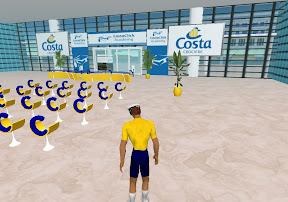
Remember the days when going to training meant some time out of the office and flying, maybe, to some interesting interesting city for a couple of days? Thanks to the internet, you no longer get to travel anywhere, let alone have any time out of the office for training - and Costa Cruises is set to take full advantage of the latest in internet technology to train their travel agents in a way most agents probably haven't seen yet.
The line's online booking engine has recently been upgraded with a number of new features, and in order to train agents, Costa has built a classroom in the virtual version of their Palacrociere on Second Life, called Costa Click Second Life Academy. (Costa hasn't yet firmed up plans for US agents to "attend" the academy.)
For those readers unfamiliar with Second Life, the company describes itself as "a 3D online digital world imagined and created by its residents." It's hard to describe if you don't understand, but when you sign up, you create a digital representation of yourself, and you walk around and do things and "buy" virtual things there with virtual money. How do you get the money? Well, you start out by "buying" some with real money that you give Second Life. There are zillions of members around the world. For example, this afternoon at about 2pm Eastern time, there were almost 46,000 people from around the world logged on, and in the last 24 hours, they had spent more than $1.1 million.
Second Life has become so ubiquitous that real companies are starting to do real business there. NBC News, for example, will be participating in a job fair there. Likewise, Costa has set up their Palacrociere cruise terminal there, and as we mentioned, has created a classroom in the "building" (above) and will actually be holding classes there where real travel agents will learn about their real product and booking engine.
At the end of the class, agents will be able to walk around the digital model of the cruise ship Costa has built in Second Life. Now if you are ready to expand your mind, think about this: At some point, will Costa be selling virtual cruises on that ship? (for virtual money, which of you have earned in Second Life or acquired by paying real money) And if you go, will you enjoy yourself and come back relaxed? How will the spa thing work? Will the therapist in the spa try to sell you virtual products, and how will you use them? Maybe I just don't get this, but the agent training part sounds cool.
